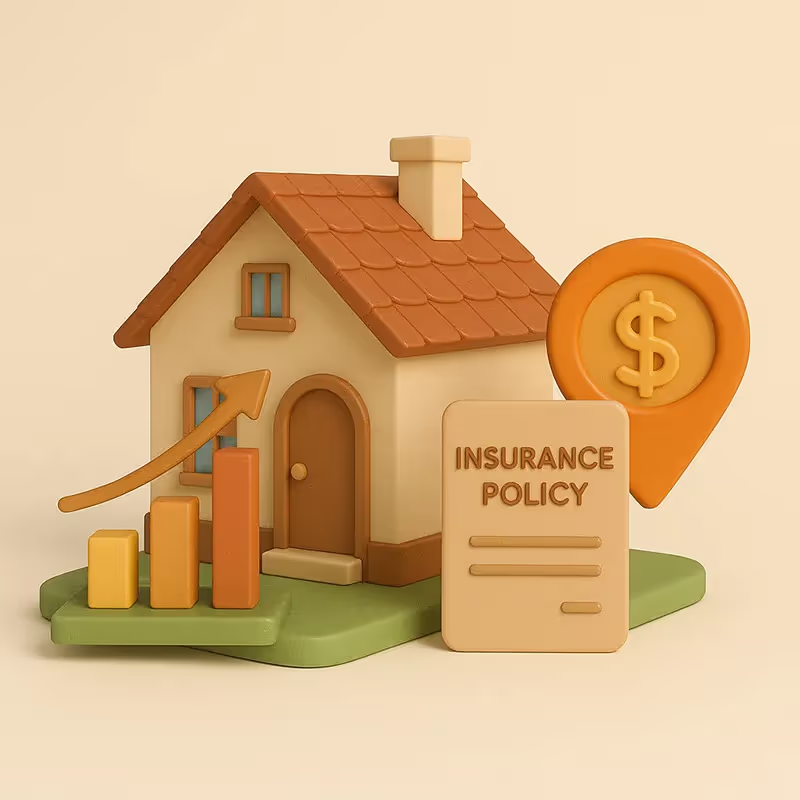How Your Property Value Impacts Insurance Rates & How to Keep Costs Down

Home insurance premiums are based on your home's replacement cost; not its market value. If your rebuild cost rises due to renovations or higher local construction prices, your premium likely increases too.
Market dips won’t necessarily lower premiums, since insurers focus on what it would cost to rebuild, not what your home could sell for.
Home insurance premiums aren’t just based on risk. They’re also tied to how much your home is worth. Or more specifically, how much it would cost to rebuild it.
This surprises a lot of people. Especially if you’ve just gotten an appraisal or checked your Zestimate and figured, well, that’s my value. But insurance doesn’t really care what your home could sell for. It’s focused on replacement cost.
Let’s break that down in plain English.
Market value vs. replacement cost
The price your home would sell for and the cost to rebuild it aren’t always the same. Sometimes they’re wildly different.
Your market value reflects things like:
- Land value
- Neighborhood demand
- School districts or view
- Supply and demand in your area
Your replacement cost, though, is just about:
- Materials
- Labor
- Local construction costs
- Home features (like flooring, roofing, plumbing, etc.)
So, even if your home is worth $300,000 on Zillow, it might cost $400,000 to rebuild. Or $250,000. It depends on how it's built and how much it would cost to reconstruct it in your area right now.
And that’s the number your insurer looks at when pricing your premium.
When value increases, premiums often do too
If your property value (again, we’re talking about rebuild cost) increases, your premium will usually follow.
Why?
Because if something happens (a fire, a hurricane, whatever) the insurer will have to cover more. So they charge more to account for that higher potential payout.
You might notice a bump after:
- A major home renovation
- Installing luxury materials or finishes
- A regional jump in construction costs
- Your insurer adjusting your rebuild estimate
I had a neighbor who added a big outdoor kitchen and some stonework. Looked amazing. But their renewal premium jumped a few hundred dollars. Because now their rebuild cost went up.
What if your home’s value drops?
You’d think a drop in property value would give you a break on your insurance. And maybe, in some cases, it does. But it’s not guaranteed. Not even close.
Here’s why: your market value and your insurance value aren’t always on speaking terms.
Let’s say home prices in your neighborhood fall because of a cooling market or local demand shifts. Maybe a new highway’s going in nearby, or a big employer left town. Your real estate value goes down. But that doesn't change what it costs to rebuild your house if it burns down or floods tomorrow.
Because for your insurer, the question isn’t “how much is this house worth to buyers?” It’s “how much would we have to pay to rebuild it (same size, same finishes) if something goes wrong?”
And that cost is driven by things like:
- Labor rates in your zip code
- Supply chain issues for materials
- Local contractor availability
- Any building code updates since your home was built
So even if your home drops $30,000 in market value, your premium may not budge if rebuild costs stay flat (or go up).
There’s also a lag. Insurers don’t recalculate your rebuild cost the second the market shifts. They use internal models, past claims, and cost indexes that aren’t tied to Zillow or Redfin. Sometimes they adjust annually, sometimes less often.
If you're not sure what value your insurer thinks your home would cost to replace, ask them. Or get a new quote and compare. It’s one of the easiest ways to see if you’re still priced right.
What actually influences the premium?
Your premium isn’t just pulled from thin air. Insurers run the numbers based on how expensive your home would be to rebuild; and a few other variables that add up behind the scenes.
Here’s what usually drives the cost:
- Square footage: more space means more materials, more labor
- Construction type: concrete block homes often cost less to insure than wood frame
- Special features: things like fireplaces, hardwood floors, custom cabinetry, or smart systems increase rebuild cost
- Local building costs: labor and material prices shift often, especially in high-demand or post-disaster areas
- Coverage limits: the higher your coverage amount, the more you’ll pay
Some of this is up to you: like how much coverage you choose or whether you add high-end finishes. Other parts, like inflation or regional labor shortages, you can’t do much about.
Still, it’s worth checking now and then. If it’s been a few years since you reviewed your policy, your current premium might not reflect your home’s true rebuild value. A fast way to see if you're on track? Compare quotes here and see what other carriers are basing their numbers on.
How to keep your value (and cost) in check
You can’t control the market. But you can avoid overpaying by doing a few simple things:
- Review your coverage yearly: make sure your limit matches actual rebuild costs
- Skip over-insuring for land: you don’t need to cover the dirt under your home
- Don’t under-insure either: that can backfire during a total loss
- Ask for a replacement cost estimate: many insurers offer them
- Bundle or add wind mitigation: to lower premiums without changing value
If you’ve made big upgrades or just haven’t updated your policy in years, it’s probably time. A quick free quote from Worth Insurance can help you see if you're over (or under) insured based on your property's real cost to rebuild.
Quick recap: property value vs premium
- Insurers base premiums on rebuild cost, not market price
- Luxury upgrades raise that cost, and your premium
- Market downturns don’t always lower your insurance
- Regular policy reviews can help avoid surprises
And if something feels off about your current rate; if it’s crept up but your home hasn’t changed, there’s a good chance it’s time to shop around.
You can start here: compare quotes now and see how your home's value stacks up.
To see how Worth can reduce your risk.
Get a Free Quote

















.%20Florida%20Home%20Insurance.%20.avif)



